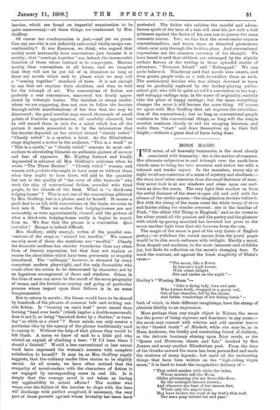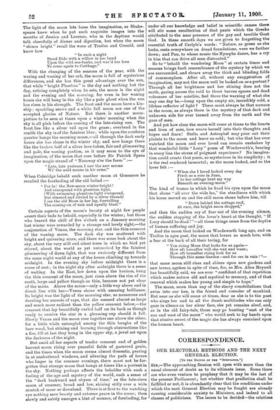MOON MAGIC.
THE moon, of all heavenly luminaries, is the most closely associated with humanity : she is the mother of romance. Her alternate subjection to and triumph over the earth-born clouds seem to bring her into nearness and endow her with a
tolerant and tender aspect. In the moonless, starry sky at night we all are conscious of a sense of mystery and aloof ness,— the stars have other concerns than the small destinies of man ; they never look in at our windows and shine upon our roof- trees as does the moon. The very light that reaches us from the awful distance of the stars is ages old and cold with the silence of the stellar spaces,—the imagination shrinks before it. But with the rising of the moon come the whole troop of elves and fairies riding her slender crescent : she is the familiar of Puck, "the oldest Old Thing in England," and as she waxes to her silver round all the passion and the poetry and the glamour with which up-gazing mankind has invested her gives to the moon another light than that she borrows from the sun.
The magic of the moon is part of the very fabric of English poetry,—to withdraw the varied moons from the poets' pages would be to dim much radiance with twilight. Hardly a mood, from despair and madness, to the most innocent and childlike joy, but finds its reflection on the moon's changing face. To mark the contrast, set against the fresh simplicity of Blake's
verse—
"The moon, like a flower In heaven's high bower, With silent delight Sits and smiles on the night "—
Shelley's "Waning Moon "— " Like a dying lady, lean and pale Who totters forth, wrapped in a gauzy veil, Out of her chamber, led by the insane And feeble wanderings of her fading brain"—
both of which, in their different imaginings, have the stamp of absolute fidelity to an impression.
More perhaps than any single object in Nature, the moon has the power of being supreme and dominant in any scene,— the moon may consort with witches and add another horror
to the "blasted heath" of Macbeth, while she may be, as in Hans Andersen, the kindly and comforting friend of children, or the delicate luminary shining upon fairy revels, or the "Queen and Huntress, chaste and fair," invoked by Ben Jonson and many another Elizabethan poet. From the time
of the Greeks onward the moon has been personified and made the mistress of many legends ; but amid all the enchanting things that have been written on the "high-riding virgin moon," it is hard to touch the imaginative delicacy of- " That orbed maiden with white fire laden,
Whom mortals call tho Moon,
Glides glimmering o'er my fleece-like floor, By the midnight breezes strewn;
And wherever the beat of her unseen feet,
Which only the angels hear, May have broken the woof of my tent's thin roof, The stars peep behind her and peer."
The light of the moon lets loose the imagination, as Shake- speare knew when be put such exquisite images into the mouths of Jessica and Lorenzo, who in the daytime would talk cheerfully of dinner and digestion, but when the moon "shines bright" recall the woes of Troilus and Cressid, and know how "In such a night
Stood Dido with a willow in her band Upon the wild sea-banks, and wav'd her love To come again to Carthage."
With the changing of the seasons of the year, with the waxing and waning of her orb, the moon is full of mysterious differences, and she has this great advantage over the sun, that while "bright Phoebus" is the day and nothing but the day, retiring completely when be sets, the moon is the night and the evening and the morning, for even in her waning hours she will hang in the sky like a pale ghost when the sun has risen in his strength. The frost and the moon have a kin- ship : sparkling snows and a white full moon are one of the
accepted glories of Nature.. But there. is another moon-
picture to be seen at times upon a winter morning when the sky is all pink before the coming of the late-rising sun. The frost lies like a silver veil upon the grass ; overhead in the zenith the sky is of the faintest blue ; while upon the southern quarter hangs the morning moon,—all through the dark early hours she has shone in the winter sky, and now hangs there like the broken half of a silver love-token, fair and glimmering and pale, the waning portion, as it may seem to the eye of imagination, of the moon that rose before Sir Patrick Spens upon the magic strand of " Noroway o'er the faem"
"Late, late yestreen I saw the new moons Wi' the auld moone in hir arme."
When Coleridge beheld such another moon at Grasmere he recalled the foreboding of the old ballad :—
"For lo! the New-moon winter-bright! And overspread with phantom light, (With swimming phantom-light o'erspread, But rimmed and circled by a silver thread) I see the old Moon in her lap, foretelling The coming-on of rain and squally blast."
Certain aspects of the moon's beauty at night few people ..iesert their beds to behold, especially in the winter; but those who braved the chill of five o'clock on a January morning
last winter were rewarded by a strange and lovely sight,—the conjunction of Venus, the morning star, and the thin crescent of the waning moon. The dark sky was scattered with bright and quivering stars, and there was some look about the sky, about the very still and silent trees in which no bird yet stirred, about the world as yet untouched by the faintest glimmering of dawn light, that was curiously different from the same night world at any of the hours climbing up towards
midnight. In the evening sky before midnight there is a sense of rest ; in the night sky after midnight there is a sense of waiting. In the East, low down upon the horizon, hung the thin crescent of the moon, just risen above the rim of the earth, large and yellow though so thin, because not yet clear of the mists. Above the moon—only a little way above and in direct line with her—Venus shone with amazing brilliance. So bright was the light of the morning star, so numerous and dazzling her aureole of rays, that she seemed almost as large and much more radiant than the yellow crescent below,—the crescent that lay beautifully curled half on its back as though ready to receive the star in a gleaming cup should it fall. Slowly Venus and the moon rose together one above the other, for a little while entangled among the thin boughs of the bare wood, but shining and burning through obstructions like a fire, till at last they hung in the upper sky, a jewel set upon the darkness of the night.
But amid all her aspects of tender crescent and of golden harvest moon rising over peaceful fields of garnered grain, and the times when the moon seems almost domestic, peering in at unshuttered windows, and silvering the path of lovers who linger in the summer evenings, there must not be for- gotten that strange moon that hangs at times like a portent in the sky. Nothing perhaps affects the beholder with such a feeling of the age and mystery of the world, such a sense of the "dark backward and abysm of time," as the late-risen
moon of summer, broad and low, shining stilly over a wide .stretch of moor or downland. There is at first to the watching eye nothing save beauty and extreme peace in the scene ; then slowly and subtly emerges a hint of menace, of foreboding, for under all.our knowledge and belief in scientific causes there will stir some recollection of that panic which the Greeks
attributed to the near presence of the gay and terrible Goat God. In these smooth days we are given to forgetting the essential truth of Carlyle's words : "Nature, as green as she looks, rests everywhere on dread foundations, were we farther down; and Pan, to whose music the Nymphs dance, has a cry in him that can drive all men distracted."
So to "behold the wandering Moon" at certain times and seasons brings back remembrance of the mystery by which we are surrounded, and shears away the thick and blinding folds of commonplace. After all, without any exaggeration of imagination, may not the moon well be looked on as a portent? Through all her brightness and her shining does not the earth, gazing across the void to those barren spaces and dead volcanoes of her satellite, feel there the warning of what she may one day be,—hung upon the empty air, incredibly cold, a lifeless reflector of light ? There must always be that menace in the moon, as always there is the mystery of that dark and unknown side for ever turned away from the earth and the gaze of men.
And yet bow close the moon will come at times to the hearts and lives of men, how weave herself into their thoughts and hopes and fears! Stella and Astrophel may pour out their plaints to the moon and leave us cold; but who that bas ever watched the moon and ever loved can remain unshaken by that wonderful little "Lucy" poem of Wordsworth's, bearing in every line the stress of poignant experience ? No imagina- tion could create that poem, so mysterious in its simplicity ; it is the real rendered immortal; so the moon looked, and so the lover felt :—
" When she I loved looked every day Fresh as a rose in June, I to her cottage bent my way Beneath an evening-moon."
The kind of trance in which be fixed his eyes upon the moon that shone "all over the wide lea," the steadiness with which his horse moved on and the still moon shone before him, till
"Down behind the cottage roof, At once, the bright moon dropped,"
and then the sudden cry of fear out of the evening silence, the sudden stopping of the lover's heart at the thought, "If Lucy should be dead !"—all these things come from the depths of human suffering and joy.
And the moon that looked on Wordsworth long ago, and on Troilus in ages past, the moon that lovers so much love, with a fear at the back of all their loving, for
"Von rising Moon that looks for us again—
How oft hereafter will she wax and wane; How oft hereafter rising look for us Through this same Garden—and for one in vain !"—
that same moon still rises and shines upon new gardens and new lovers, ageless in spite of time, for, as Mrs. Alice Meynell has beautifully said, we are ever "confident of that repetition which makes nature old and mystical to memory, and of that renewal which makes her young and simple to hope."
The moon, more than any of the starry constellations that swim into our ken, is the friend and consoler of mankind. But near as she will come at times, dear as she is to the poet who sings her and to all the dumb multitudes who can only gaze in silence on her silver face, she yet remains aloof, and, as in the old fairy-tale, those may go hunting "east of the sun and west of the moon" who would seek to lay hands upon that elusive secret of the magic she has always exercised upon the human heart.











































 Previous page
Previous page